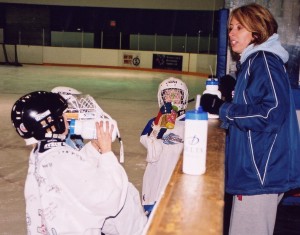By Lisa Brown
I personally think that most parents feel a very powerful desire to boost the confidence of their children. If you watch parents with their children, particularly after they’ve just played a ringette game or excelled at school, you can SEE IT.
Maybe you’ve been there yourself. You see your children excelling…you see the improvements they are making, and you want them to celebrate their achievements. Most of all, you want them to praise themselves (and revel in the self-esteem that comes from their self-praise).
The main way I’ve seen parents try to boost their children’s self-esteem is through PRAISE.
Why Praise Can Harm Your Child’s Self-Esteem
What’s wrong with praising your child? Nothing. It’s not praise that’s the problem. It’s the way parents deliver praise that is the problem.
Most parents praise their children based on what they (the parents) think of their child’s actions. For example, they say, “You are doing great,” “You are a good girl,” “You are smart,” or “You are super-athletic.”
When you praise your child in this way, you are using judgmental praise. It is based on YOUR judgment of your child’s performance, behaviour, or personality.
When you give judgmental praise, you send the following messages on a ‘subtle’ level:
I’m the person who decides whether you performed ‘good’ or ‘bad’ in this situation.
My approval is desirable.
These messages create dependency in your child. They do this by encouraging her to seek your decisions and approval.
For example, your daughter asks you to read her English paper and you say, “Honey, what a great paper! Carry on your good work.”
Even though your judgment is positive, it encourages your child to rely on your thinking and approval.
What Kind of Praise Should You Use?
The best type of praise is praise that trains your child to become self-reliant and seek his/her OWN approval. This is what healthy self-esteem demands. The opposite of judgmental praise is factual praise. Factual praise encourages your child to rely on his/her own judgment and approval.
For example, after reading your daughter’s paper, you comment on what she has accomplished. “When you described England in the early 1990s in such vivid detail, I actually felt as though I was there. It was easy to get interested in the topic.”
Beaming, your daughter decides, “My paper was interesting to my Mom. I am a good writer.”
Why Factual Praise Builds Confidence in Children
A key ingredient of self-esteem is the ability to trust our mind. Our mind is our basic tool for survival. So, when we believe we can mentally cope with the basic challenges of life, we feel good about ourselves. We may lack knowledge or skills in a subject, but we have faith in our mind that we can learn whatever we need to learn to be successful.
Factual praise builds your child’s confidence by building self-reliance. They learn to draw their own conclusions.
Here are some examples:
- Judgmental praise: “You played a great ringette game.”
- Factual praise: “I couldn’t help but notice how many times you skated to where the ring was going as opposed to where it was. When you did that, you created open space and often received the pass to create a fast break.”Your child now draws his own conclusion: “I am a smart player!”
- Judgmental praise: “You’re smart. Great job at school!”
- Factual praise: “I saw that every day this week you came home and did your homework right away. That is difficult to do. But you did it.”
Your child decides, “I am a hard-working student.”
Judgmental praise: “You’re an excellent ringette player.”
Factual praise: “I thought the beginning of the second period was a key time in that ringette game in terms of momentum. I saw that you checked aggressively during that time frame and noticed that your turnover led directly to your team’s winning goal.”
Your child determines: “I’m a talented checker and I step up in a ringette game when it matters most.”
When you give your child factual praise, they rely on their own judgment. They become self-approving, and their self-esteem grows. You also give them psychological visibility. They relax. They know you see their brilliance, and they love being ‘seen’ by you.
Factual praise is really easy to pull off. Just describe the facts of what your child accomplished.




Omg, this like, totally touched my heart in places unknown! I totally agree and I also wanted to say that ringette is like, amazing and should be seen more by people who are like, waaayyy to busy doing stupid things like watching hockey. If I had kids I would definetly make them do ringette cuz you know, it’s like, awesome and stuff. They would have like, the most amazing time! I wish I played when I was little, instead of stupid ballet! I didn’t even learn anything! Totally a waste of my moms money… Like, seriously, we had to pay like $500 for stupid little dresses and we couldnt even keep them? What’s up with that, ya know? But, anyways. Ringette sounds cool. What is it anyways? Like long sticks with little hoola hoops or something? Kinda like Quiditch from Harry Potter? Anyways, I have to go. My boyfriend is taking me to the movies! Soooo excited!!
Bye 🙂